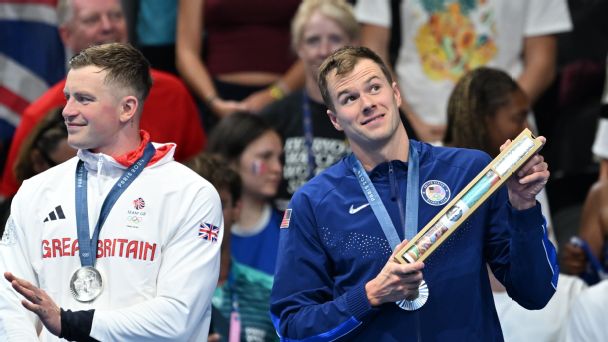'I'd swim in anything to try and get a medal': Latest on the River Seine
PARIS — Each night, as Paris sleeps and the Eiffel Tower stands in darkness, a group of around 15 officials and scientists gathers at the River Seine to take a water sample.
For the duration of the Olympic Games, the group — consisting of people from World Triathlon, the Paris 2024 organizing committee, the mayor’s office and regional officials — has huddled up on the river as precautions over its water quality hit new levels. The city of Paris has reportedly spent 1.5 billion euros to clean up the river.
The group takes two samples to test the E. coli level each day. The first is at 3:30 a.m. CET, when the only other people around are a handful of ground crews putting together the triathlon pontoon; the other is at 3 p.m. CET.
Those samples have already had an impact.
Both pre-event swim opportunities have been canceled because of concerns over the water’s quality. Whether the men’s triathlon race will go ahead on Tuesday is yet to be decided. The results take 24 hours to come back, meaning the sample that will decide whether the men’s race will go ahead has already been taken.
The results will be in at 3:30 a.m. with a decision — which also involves a range of other factors — made soon after. Should it be declared unsafe, the backup plan is to run the race on Friday.
So far, conditions for the men’s race look good. Officials are not concerned about the pollution levels given that two hot days have preceded Tuesday’s race. However, rain is forecast for Tuesday morning, with the pollution levels very closely tied to poor weather.
There is a strange duality at play here: Speak to any triathlete or federation official and they’ll tell you this is all typical for them. Triathlons are held all over the world, many in open water that is of a lower quality than the Seine. And yet, the fact that both prep swims were canceled prompts obvious concerns.
It has been reported that some triathletes will take extra measures to deter any potential illness, such as eating yogurt, taking probiotics, using mouthwash and disinfecting their wetsuits after the race. However, most of those measures are routine.
“We actually raced here last year in the test event, and I don’t think anyone got sick after the race, so that can’t be said about all the races we do,” American triathlete Seth Rider said.
“To be honest, for me, I’d swim in anything to try and get a medal,” Australian triathlete Matt Hauser told the Sydney Morning Herald.
City officials balked at the idea that any such concerns were necessary earlier this week. Pauline Lavaud, an advisor to Paris mayor Anne Hidalgo, said: “I think they had much higher rates of bacteria in the Seine, and even then they didn’t have problems. So it’s not about being just under or just over.
“Of course there are decisions that need to be made and we need to follow the rules that were established. But it’s not like if you swim in a river with a little higher level that you’ll get sick instantly.”
And yet, nobody quite knows whether the race will go ahead as planned on Tuesday. We’ll only know for sure when the group huddles up again in the dead of night and delivers their verdict.




